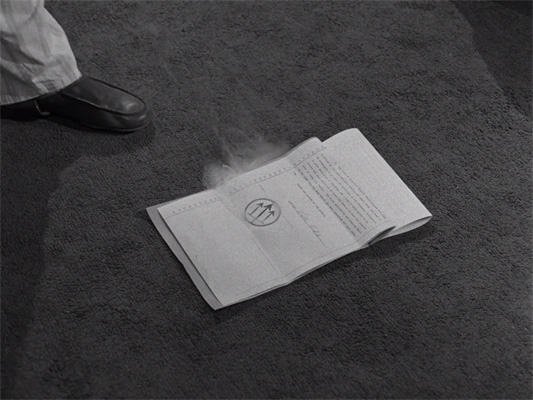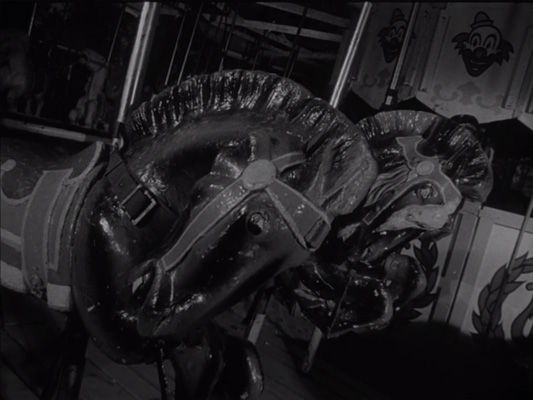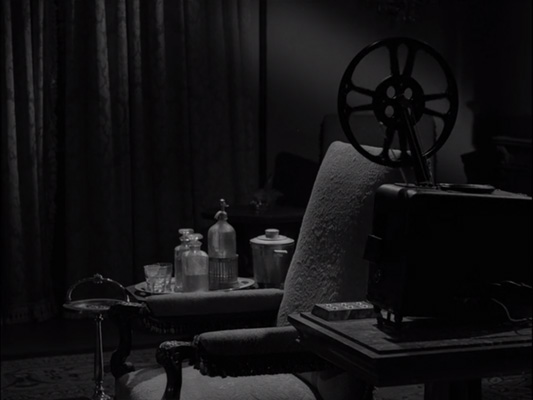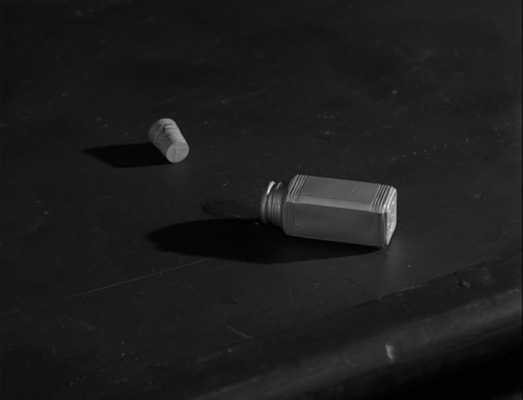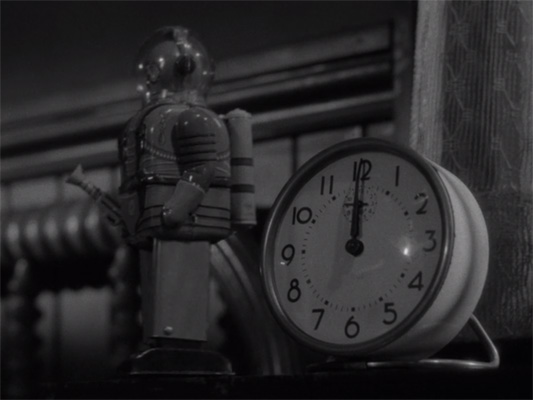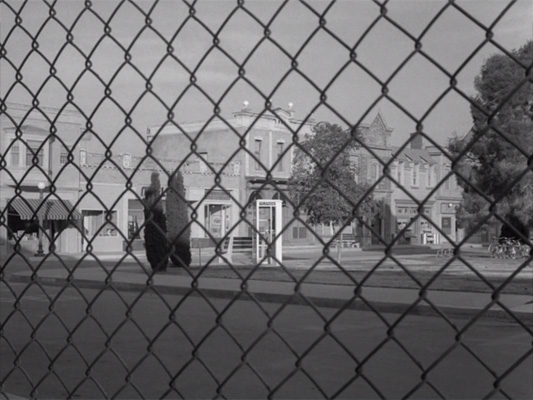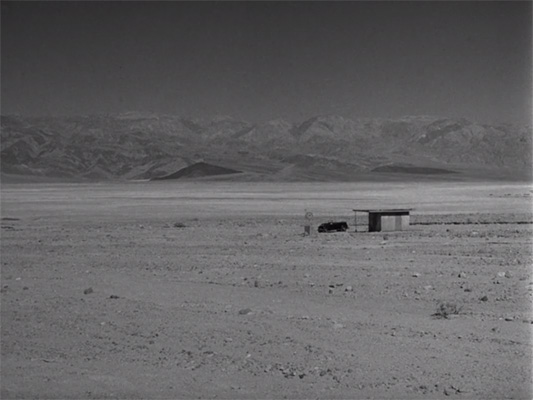
directed by Jack Smight
written by Rod Serling
starring Jack Warden
with John Dehner and Jean Marsh
music by Bernard Herrmann
Friday, November 13, 1959, 10 PM EST on CBS.
This one is a gem.
Purely from a trope-spotting perspective (“Robot in the form of a woman, check”) it’s pretty ordinary stuff. Sometimes I lapse into processing stories like that, like I’m one of those coin sorting machines, separating everything into neat piles by diameter. Taken that way there’s nothing too memorable here. It’s just standard sci-fi (philoso-fi) tropes. “Is it man and woman? Or man and machine?” Sure.
But something in the execution makes the episode stand up and carry real meaning. Principally I think it’s Jack Warden, who is so utterly un-nerdy, un-pulp. Embodied his particular face and manner, the material manages to convey an impression that something strange and fragile is at stake. Seeing this big American lug set against the backdrop of utter desolation and Bernard Herrmann’s weeping celestial vibraphones creates a beautiful cosmic noir effect.
It’s poignant to watch an unreflective type being confronted with emotional issues; we feel the difficulty, the ache. This guy is the old American self-image of everyday sturdiness, squinting hard to try to cope with the idea that he has a spiritual life. “Well if that isn’t the damndest thing…” It’s a nameless but familiar archetype: the tough American male as a kind of big little kid. A guy who… who… damn it — who needs all the help he can get, damn it!
Corry is presented as having the narrowest possible scope of imagination. Surely a man stranded for years alone in a desert would have by now made himself at least somewhat into a creature of the desert, like Lawrence of Arabia. He wouldn’t still be wearing belted slacks and a button-down shirt, or eagerly begging his occasional visitor to “have a beer” and “play cards.” Then again, why does anyone wear belted slacks and a button-down shirt. We’re all putting on silly costumes to go be alone on our blasted asteroids.
The asteroid is existential fact. The little shack is the subjective human bubble in which Corry’s life makes sense to him. Anyone we try to let into our own shack of subjectivity is just an object to us; we will never actually merge our subjectivities. That is to say that from any individual’s point of view, in a very real sense, other people are truly indistinguishable from robots.
The quandary posed to Corry by Alicia is not whether she’s “real” — which is a distinction without a difference — but whether he dare allow himself to have feelings about her, like he does about the (equally meaningless) car and beer and chess, and about his own bodily self.
He desperately doesn’t want to be tricked because he’s afraid of becoming “insane.” His nervousness and anger and embarrassment when she arrives are at the idea of succumbing to insanity. But in the absence of any other humans, what’s the risk?
And for that matter, don’t forget that the other humans in his life — the ones he’s saving his sanity for, in three months, or in years when he’s eventually released — are just as much subjective indulgences. They always have been.
All feelings are equally subjective. Corry, angrily to Alicia, indicating the car: “This heap doesn’t mock me the way you do.” Oh yes it does! You attribute meaning to it, too.
Eventually, of course — upon seeing her tears and thus obscurely remembering his own — he gives in to the inner life, to subjective happiness. To hell with the drab, soulless “sanity” represented by the men in jumpsuits.
It’s difficult to write down what has been the sum total of this very strange and bizarre relationship. Is it man and woman? Or man and machine? I don’t really know, myself. But there are times when I do know that Alicia is simply an extension of me.
Immediately after thus acknowledging that she is him, he sits with her/himself and takes pleasure in the stars, in the universe, to Bernard’s lovely dream planetarium music, as though it’s a romantic date. This scene moves me. Being alive and being oneself is indeed a kind of romantic date. “Always meeting ourselves,” as Joyce says. “Every man his own wife.”
Unspoken but implied, in Corry’s speech above, is the acknowledgment that all his social experiences have been founded on similarly unverifiable grounds. The Turing test is a good standard for artificial humanness because it’s the only standard we have for “real” humanness, too. All we are is subjective — and then, on top of that, social. There is no such thing as “objective.”
What he’s actually waiting on, from the faraway mass of humanity (who in his mind are holding the definition of “sanity” hostage), is, in so many words, “a pardon.” After accepting himself in the form of Alicia, he finally gets the pardon, but now isn’t entirely sure what the point is. Why not live with a robot, alone with this loving extension of himself? Who do these Earthlings think they are, anyway? Just a world of smarmy, hostile Ted Knights.
Of course then they strip him of Alicia, his externalized soul, by violence. He pleads on behalf of the mute, feeling part of himself: “She’s gentle and kind!” He implores her to make herself socially apparent: “Talk to them! Show them!” But the soul, the emotions, curls up under pressure to perform. It’s not good for proving anything to anyone. It simply is.
After she’s shot, the blasted mechanism behind her face gives him pause. (“Oh wait, look at the metal; maybe I was crazy.”) But this is a trick ending. After all, blasted bone and blood and gristle would be equally a betrayal of the humanity he felt in her. (“Oh, she was just some kind of gross biological organism; maybe I was crazy.”) The betrayal is not in the nature of the substance but in the fact that there is a substance at all.
We end, appropriately, on the question of Home. “All you’re leaving behind is loneliness.” To the contrary, Corry is reentering the loneliness that has attended him his whole life, the loneliness of yearning for the “real” rather than trusting in his own projection of it.
In this case, I feel pretty sure that Rod was being deliberately sardonic about the hollowness of the conservative redemption being offered: “I must remember that. I must remember to keep that in mind.”
But as usual, the brilliance is that this ending genuinely works for all comers. If you the viewer are desperately afraid of “going insane” and falling in love — as many people are — you are welcome to take sincere comfort in the fact that a paternal, pitying Captain Allenby will surely eventually come along and save you by shooting your love in the face, waking you from your madness and returning you to respectable society. Free at last!
You’re innocent, after all. You deserve a pardon: you only killed in self-defense! “There are still a lot of people who believe me! And it happens to be the truth!”
• There’s no way those stacked and unstacked nuts and washers represent all the chess pieces.
• The whiteness of the desert looks great. Did they do something special to the exposure to make it more asteroidal, or did Death Valley always look white in black-and-white westerns?
• I had thought that the old pronunciation “robit” must simply have become “robot” at some point in time (maybe in the 60s), but I just looked into this, and: 1) apparently “robit” lives on even today in some parts of the USA, and 2) I have ascertained that Leslie Nielsen says “robot” in the highly robot-influential Forbidden Planet (1956), which predates this episode by several years. Is it possible that his Canadian accent provided the model for future American pronunciation? Unlikely, but a fun thought anyway.
The fourth original score in the series, and third by Bernard Herrmann. Probably the least conspicuous, most subliminal music thus far, but deeply effective. Even I, a film music obsessive, had to think hard to peel the effect of the music off of the story itself, so that I could consider it separately. That’s a mark of success, in this game.
Put it on in the background and see how thoroughly it coats every surface of your room with its mood.
